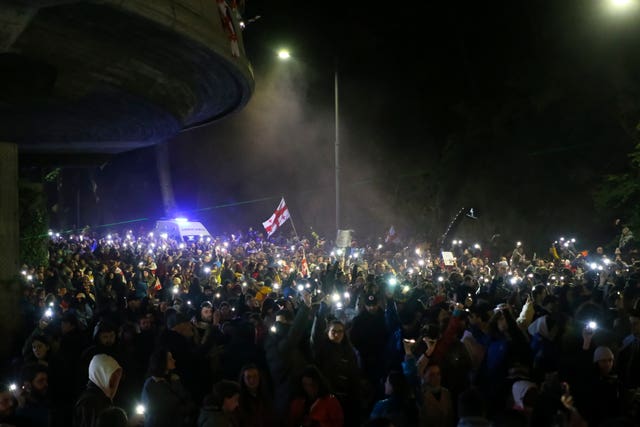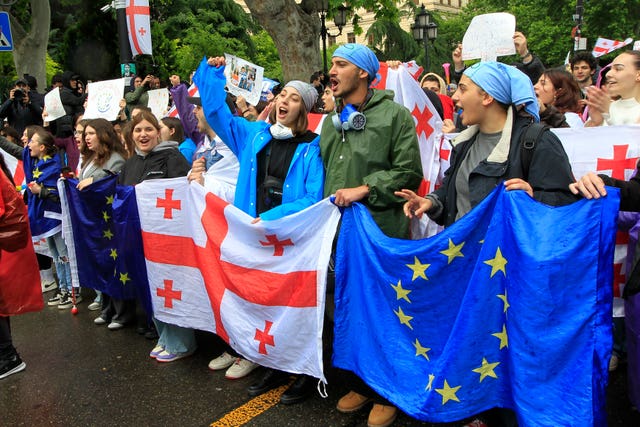
Clive Bull 1am - 4am
18 May 2024, 17:44

President Salome Zourabichvili said the law contradicts Georgia’s constitution and ‘all European standards’, and added that it ‘must be abolished’.
Georgia’s president has vetoed the so-called “Russian law” targeting media that has sparked weeks of mass protests in the country.
The law would require media and non-governmental organisations (NGOs) to register as “pursuing the interests of a foreign power” if they receive more than 20% of their funding from abroad.
Critics of the bill say it closely resembles legislation used by the Kremlin to silence opponents, and that it will obstruct Georgia’s bid to join the EU.
President Salome Zourabichvili, who is increasingly at odds with Georgia’s ruling party, said on Saturday that the law contradicts Georgia’s constitution and “all European standards”, and added that it “must be abolished”.

The ruling party, Georgian Dream, has a majority sufficient to override Ms Zourabichvili’s veto, and is widely expected to do so in the coming days.
The Georgian government insists that the law is intended to promote transparency and curb what it deems harmful foreign influence in the country of 3.7 million.
Many Georgian journalists and campaigners fiercely dispute this characterisation, saying they are already subject to audit and monitoring requirements. They say that the law’s true goal is to stigmatise them and restrict debate ahead of parliamentary elections scheduled for October.
The EU offered Georgia candidate status last December, while making it clear that Tbilisi needs to implement key policy recommendations for its membership bid to progress.
The recommendations concern, among other areas, elections that must remain free and fair, fighting disinformation “against the EU and its values”, and safeguarding the independence of public institutions such as the central bank and anti-corruption bodies.
The opposition United National Movement and many protesters accuse Georgian Dream of trying to scupper the EU integration process, and to instead drag Georgia into Russia’s sphere of influence – allegations the ruling party vehemently rejects.
Georgian Dream was founded by Bidzina Ivanishvili, a former prime minister and billionaire who made his fortune in Russia.
The bill is nearly identical to one that the party was pressured to withdraw last year after street protests.
Renewed demonstrations have rocked Georgia for weeks, with demonstrators scuffling with police, who used tear gas and water cannons to disperse them. An opposition politician earlier this month spoke in parliament with a bandaged face, visible bruises and cuts. His allies said he had been assaulted by police during the protests.
EU officials and western leaders have repeatedly expressed concerns over the law, as well as Tbilisi’s heavy-handed response to dissent.
The EU’s top diplomat, Josep Borrell, issued a statement on Wednesday in support of the Georgian protesters, and to condemn what he described as a wave of violence against opposition politicians, activists, journalists and their families.
European Council president Charles Michel said on Tuesday that if Georgians “want to join the EU, they have to respect the fundamental principles of the rule of law and the democratic principles”.

Ms Zourabichvili told the Associated Press in an interview on Thursday that it was hard to say whether the bill was Georgian Dream’s initiative or if Moscow had played any role in its passage, but she emphasised that the Kremlin is unhappy with Georgia’s pro-western aspirations.
“It’s clear that Moscow is not seeing with lots of appreciation this accelerated pace of Georgia towards the European Union,” she said.
Russia-Georgia relations have been strained and turbulent since the 1991 collapse of the Soviet Union and Georgia’s departure from its role as a Soviet republic.
In 2008, Russia fought a brief war with Georgia, which had made a botched attempt to regain control over the breakaway province of South Ossetia.
Moscow then recognised South Ossetia and another separatist province, Abkhazia, as independent states and strengthened its military presence there. Most of the world considers both regions to be part of Georgia.
Tbilisi cut diplomatic ties with Moscow, and the regions’ status remains a key irritant even as Russia-Georgia relations have improved in recent years.